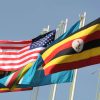Columnists
Government ‘legitimacy’ haunts opposition
Every after an election a government is sworn in and taken to be a legitimate authority entrusted with the duty to run the affairs of the state. In political science, usually a governing law or a régime.
An authority viewed as legitimate often has the right and justification to exercise power. Political legitimacy is considered a basic condition for governing, without which a government will suffer legislative deadlock(s) and collapse.
It is this legitimacy again which the government in power uses to its advantage to suppress the opposition.
Max Weber proposed that societies behave cyclically in governing themselves with different types of governmental legitimacy. That democracy was unnecessary for establishing legitimacy, a condition that can be established with codified laws, customs, and cultural principles, not by means of popular suffrage.
He continues to say that a society might decide to revert from the legitimate government of a rational-legal authority to the charismatic government of a leader. This was the case for the Nazi Germany of Adolf Hitler, Fascist Italy under Benito Mussolini, and fascist Spain under General Francisco Franco.
Political scholars have pondered over the question of whether or not a political opposition has the capacity to challenge the legitimacy of the government in power.
In the first place, the division between government and opposition is as old as political democracy itself.
In Aristotle’s Athenian polity the essence of self-government was that citizens were, in turn, both the rulers and the ruled. Government could alternate among different groups of citizens, and the minority could seek to persuade a majority of its point of view by peaceful political means. In an age of mass politics, direct citizen democracy has been replaced, with rare exceptions, by representative systems providing for periodic elections.
In turn, these electoral contests are usually dominated by a small number of political parties which select their own candidates and leaders.
What has not changed, however, in our modern liberal-democratic society is the hallowed principle that government must rest on the consent of the governed.
This means that the minority accepts the right of the majority to make decisions, provided that there is reciprocal respect for the minority’s right to dissent from these decisions and to promote alternative policies.
Genuine political opposition is a necessary attribute of democracy, tolerance, and trust in the ability of citizens to resolve differences by peaceful means.
The existence of an opposition, without which politics ceases and administration takes over, is indispensable to the functioning of parliamentary political systems. If these systems are perceived as not working well, it may be the rights of political oppositions which are immediately and most visibly at stake, but ultimately the threat is to democratic rights and freedoms generally.
The role of an opposition party is to check and prod, but ultimately to replace the government party. The reading of history proves that freedom always dies when criticism ends. It upholds and maintains the rights of minorities against majorities. It must be vigilant against oppression and unjust invasions by the Cabinet of the rights of the people. It should supervise all expenditures and prevent over-expenditure by exposing to the light of public opinion wasteful expenditures or worse.
The opposition finds fault, it suggests amendments, it asks questions and elicits information, and it arouses, educates and molds public opinion by voice and vote.
It must scrutinize every action by the government and in doing so prevents the short-cuts through democratic procedure that governments like to make. A striking characteristic of multiparty system in sub Saharan Africa is the weakness of political parties. Most political parties are weak and few survive more than one electoral process.
In most countries that originally had single political party systems, the transition to multiparty democracy continues to be frustrated by several factors including institutional weaknesses in practically all political parties as manifested by the lack of party philosophy or ideology, the functioning of party structures and processes, lack of participatory internal democracy due to deficit of communication between party leaders, followers and the population,
Political parties also lack resources and suffer from the dominance of personality cult together with the infiltration in politics by wealthy individuals funding political parties with sole aim to maintain the status quo.
There is lack of confidence in the electoral commission and threats from youth militias commissioned by the ruling party.
The neutrality of the security forces and the independence of the courts cannot be trusted.These among other factors are holding back the development of multiparty political system in these countries.
Comments














